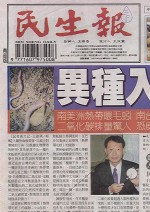Through international collaboration, LTER investigators have discovered that a species of earthworm that has invaded Puerto Rico is also invading Taiwan. Recent work by Xiaoming Zou of the Luquillo LTER site (P.R.) and Lucy Hou of the Nanhenshan site in Taiwan on the tropical earthworm P. corethrurus may influence invasive species policy.
Dr. Zou took his sabbatical leave in the National Cheng Kung University and developed a collaborative research project with Dr. Hou, examining interactions between soil fauna and soil processes. Their work on the invasion of this species in Puerto Rico revealed significant decreases in earthworm diversity, as well as increases in CO2 efflux from soil to atmosphere. The investigators warned that these ecological consequences may also occur in Taiwan. Their work was reported on in seven national newspapers in Taiwan, sparking the attention of the department of agriculture, who solicited the scientist’s advice for controlling the pervasive invader.
Originating in South America, P. corethrurus has invaded almost every part of wet tropical areas of Africa, Asia, Australia, Hawaii, and Central America. The increased need for fishing baits may have brought P. corethrurus into Taiwan.
At the Luquillo LTER site in P.R., Zou’s research team showed a 20-30% reduction in CO2 efflux in worm excluded plots, and are currently we are measuring CO2 in Taiwan in adjacent invaded and non-invaded areas, but have not published the data yet.
Assuming that
- Most of the wet tropics are invaded with this species
- The magnitude of increase in CO2 efflux is 20%, data from Puerto Rico shows that the invasion of P. corethrurus would raise the efflux of CO2 -- equivalent to the amount CO2 release by fossil fuel combustion in the world, at least for short term. The long-term effects are not yet known.
The department of agriculture of Taiwan contacted Hou and Zou, requesting advice to control the spread of the earthworms. The investigators proposed the need for more baseline information on the current status of invasion in Taiwan and research data on its potential effect on soil biodiversity and ecosystem processes. Worm studies in PR demonstrated that forest restoration would reduce the exotic species and enhance the recovery of native earthworms, thus forest restoration may be proposed as an effective way to control the spread of P. corethrurus.
There are always two sides to any coin. An increase in earthworm density after invasion can accelerate the decomposition of soil organic matter, and thus may increase soil nutrient availability and plant production, balancing the negative effect of increased CO2 efflux. But the scientists do not have field data on plant production at ecosystem levels.

 Enlarge this image
Enlarge this image